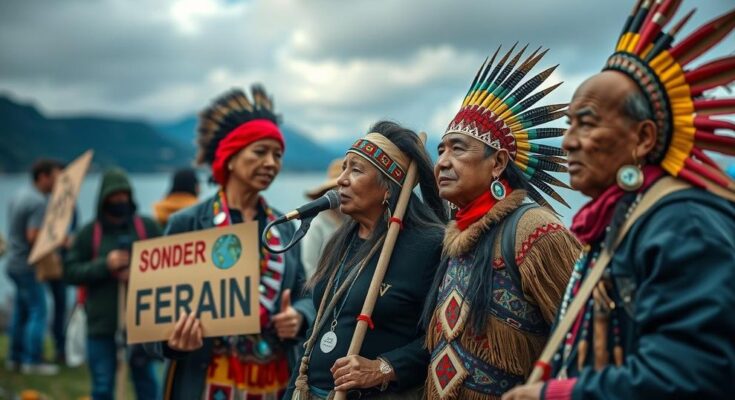At COP29 in Baku, Azerbaijan, Indigenous leaders shared their experiences and solutions regarding climate change, highlighting its devastating effects on their communities. They communicated unique challenges, such as environmental degradation and water contamination while also showcasing innovative initiatives aimed at fostering resilience. Their participation illustrates the importance of Indigenous knowledge in global climate action.
At the COP29 United Nations Climate Summit in Baku, Azerbaijan, representatives of various Indigenous communities convened to raise urgent concerns regarding the impact of climate change on their environments and ways of life. The delegates shared poignant narratives of rising sea levels, environmental degradation, and the loss of essential natural resources. These Indigenous leaders emphasized their longstanding relationship with nature and the vital role their traditional practices can play in combating climate change. Despite facing severe challenges, their communities have initiated innovative solutions to address environmental threats, embodying resilience and sustainability at the forefront of climate advocacy. Twelve Indigenous voices from regions ranging from North America to the Pacific Islands shared their perspectives, illustrating the unique ways climate change has reshaped their realities. From the Yakut community in Russia to the Iban community in Malaysia, each participant conveyed how their livelihoods and traditions have been threatened. For instance, Saina Ekaterina Savvinova lamented the diminished snowfall in Yakutsk, while Antumalen Ayelen Antillanca Urrutia spoke to the water contamination affecting his home in Chile. Moreover, Flora Vano articulated the dire consequences of rising sea levels in Vanuatu, highlighting escalating food insecurity and societal violence. Despite these challenges, many participants showcased initiatives their communities are undertaking to foster resilience against climate change. For example, Mingma Chhiri from Nepal affirmed the Indigenous commitment to environmental preservation, stating their prevention of natural ecosystem destruction. Others, such as Ninawa Inu Pereira Nunes from Brazil, emphasized actions towards reforestation and native spiritual restoration as crucial efforts to combat deforestation. As representatives from these communities emphasized, Indigenous knowledge and practices are essential in the collective fight against climate change, demanding more recognition within global environmental discussions.
The participation of Indigenous peoples at the COP29 U.N. Climate Summit underscores the critical interplay between climate change and traditional ecological knowledge. Indigenous communities worldwide experience disproportionate impacts from climate-related phenomena due to their close ties to their environments. Historically, these communities have played a fundamental role in conserving biodiversity and fostering sustainable practices. Their unique experiences and insights are increasingly recognized as vital contributions to global climate solutions, prompting discussions on inclusivity in international climate negotiations.
In conclusion, the apprehensions raised by Indigenous groups at COP29 highlight their essential perspectives on climate change and the innovation emerging from their traditional practices. Their narratives serve not only as a call to action but also illuminate the interconnectedness of social justice, environmental health, and cultural preservation. Amplifying Indigenous voices in climate discussions is crucial for fostering comprehensive and effective climate strategies that honor both human rights and ecological integrity.
Original Source: apnews.com




